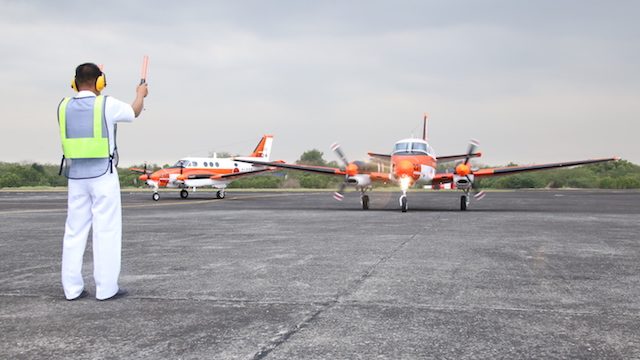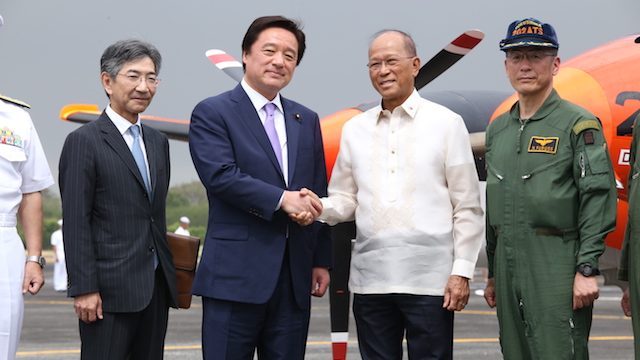SUMMARY
This is AI generated summarization, which may have errors. For context, always refer to the full article.

MANILA, Philippines – The small hand-me-down patrol planes from the former World War II enemy do not look much. But the TC90s that Japan transferred to the Philippine Navy on Monday, March 27, are symbols of a huge leap for Japan as it takes a bigger role in the security of the region.
It was the first implementation of Japan’s gamechanging move to lift its weapons export ban, one of the self-imposed policies it adopted when it took a pacifist mindsent after World War II.
“This one is the training planes. They are not even fighters. It looks like a small project, but it has a very big political, security, and diplomatic meaning,” Isami Takeda, an international relations professor at Dokkyo University, told Rappler during his visit to Manila.
Takeda said it is only the start. He said bigger projects should be expected from the country’s former World War II enemy.
“We will commit to the Philippines. We will commit to Southeast Asia for our country’s security and for regional security,” Takeda said.
The Philippine Navy will lease the planes for a small sum of $28,000 a year. It would have been a donation, except Japan’s Congress is still deliberating on a new law that will allow the Japanese Maritime Self Defense Force to give used defense equipment as a grant to allies, similar to the Excess Defense Articles program of the United States.
Japan takes a security leap
The world is different half a century since the last great global conflict. Despite the strength of its military, Japan has come to recognize that the current security challenges in the region – China’s aggressivenes in the South China Sea, in particular – require international cooperation.
The lifting of its weapons export ban, although it remains restrictive, comes as Prime Minister Shinzo Abe pushes Asia’s second largest economy to take a bigger role in regional security.

It earlier made a bid to build submarines for Australia, an ally in fighting for freedom of navigation in the disputed seas, although it was a venture that Japan lost to France.
The Philippines does not have deep pockets, but it is a significant ally for Japan if only because of its geopolitical position. Japan, like US and other allies concerned with China’s aggressiveness in the South China Sea, wants to make sure that the Philippines is able to stand its ground against the Asian superpower.
PH an important nation
Japan State Minister for Defense Kenji Wakamiya highlighted this during his speech at the formal transfer ceremony for the planes on Monday. He said the Philippines is an important ally.
“The Philippines is a politically important nation for Japan as it is located in the sea line of communication to Japan. We are faced with many security-related issues in Asia Pacific, including those in the South China Sea,” Wakamiya said.
“Our cooperation with the Philippines for regional security and stability is now even more significant,” he added.
To be sure, Japan has long been assisting the Philippines’ bid to protect its maritime claims. But the law’s restrictions meant it could only transfer equipment to the Philippine Coast Guard, a civilian agency that has also stepped up to defend the country’s waters.
But territorial defense is ultimately a function of the Philippine Navy, which has been a recipient of equipment from the US. Its 3 most capable warships, the ones deployed to the West Philippine Sea, are from the US Coast Guard.
The two countries stretched their defense cooperation when, in June 2015, the Japan Maritime Self Defense Force and the Philippine Navy conducted joint training exercises in the West Philippine Sea despite the absence of a visiting forces agreement.
A petition was filed against defense officials and military officers involved in the exercises over possible violations of the constitutons. The activity was not repeated, but the previous Aquino administration began initial talks on the possibility of having a treaty that will allow Japanese troops in the country.
Great friendship?
The transfer of TC90 patrol planes will enable the Philippine Navy to better establish its presence in its maritime territories in a bid to deter China. They are faster and have longer range than the Islander aircraft the navy has been using.
In his visit to the Philippines, Wakamiya also met with Defense Secretary Delfin Lorenzana to discuss the future prospects of defense cooperation between the two countries.
In June, Japan’s largest warship is also visiting the Philippines and will make a port call in Subic, Zambales, north of Manila.
Duterte’s dislike for the US makes the Philippines’ relations with Japan very crucial. (READ: Trump, Duterte nudge Japan to new normal)
Wakamiya is confident of the “great friendship” between Duterte and Abe, citing 3 bilateral summit meetings between the two leaders in the first months of Duterte’s administration.
Except China is Duterte’s friend, too. It may come to a point when Duterte will have to decide whose friendship he values more. – Rappler.com
Add a comment
How does this make you feel?
There are no comments yet. Add your comment to start the conversation.